Northern Ireland protocol and Windsor Framework
New Brexit deal for Northern Ireland announced.

Graffiti reading “No Irish Sea Border” in Belfast, showing public need for a trade deal.
March 20, 2023
The British government and European Union (EU) have reached an agreement to solve the trade status of Northern Ireland, with a new agreement called the “Windsor Framework.”
The Windsor Framework will be including new measures to an already existing agreement called the Northern Ireland protocol, in hopes of resolving challenges that were unaddressed in earlier deals.
The problem comes from Northern Ireland being part of the United Kingdom (UK) and sharing a land border with Ireland. Negotiators have long struggled to get goods to move smoothly between Northern Ireland and the rest of the UK without completely opening the border.
Britain’s vote in 2016 to leave the EU left many unanswered questions; the most intractable of these being about Northern Ireland.
The Windsor Framework fixes this with the use of green and red lanes for goods being shipped to Northern Ireland. The green lane will have fewer checks and controls with no customs checks or rules of origin. Red lanes under the framework will be subject to full checks and controls to preserve the EU’s single market.
This is an attempt to lessen the impact on farmers. Agriculture foods such as meat and dairy will have less checks and controls. Food retailers will also be able to move agri-food via the green lane. Both EU and UK leaders are hoping this leads to greater availability of British goods in Northern Ireland stores.
The Northern Ireland protocol will allow goods to move much smoother, because goods staying inside the UK will only have to get through the green lane to enter Northern Ireland. This ensures the people of Northern Ireland can benefit from the same tax policies, food and drink, medicines, and parcels as the rest of the UK.
While this arrangement is aimed at protecting Northern Ireland’s position in the UK, and restoring its peoples’ sovereignty, it is yet to be implemented. The EU and UK will have to pass new legislation to enact parts of the framework.
The biggest uncertainty is gaining the approval of the Democratic Unionist party (DUP), who have previously refused any deal that would treat Northern Ireland differently to the rest of the country
The DUP will be having a meeting to see if they agree to the terms of the Windsor Framework in the coming weeks. Regardless of the ruling, the Windsor Framework shows that the EU and UK are willing to be lenient to solve Northern Ireland’s trade problem.

